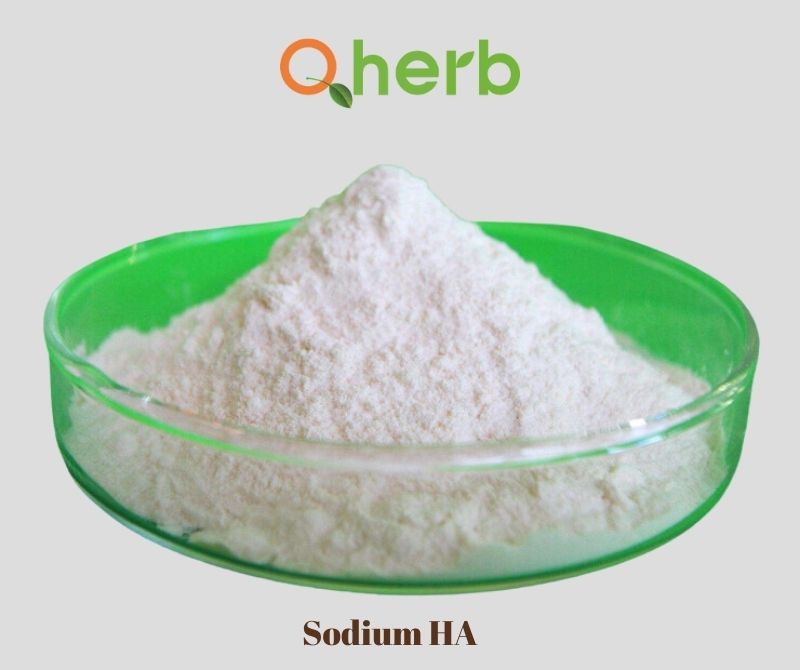What is the difference between HA and sodium HA?
The secret to the success of this substance lies in its unique ability to bind and retain moisture. One hyaluronic molecule can concentrate around itself hundreds of water molecules. In the subcutaneous layers hyaluronica acts as a kind of cement composition, which firmly holds the cells together, regulates their metabolism, and stimulates the production of collagen. Thus, the substance forms the elasticity of the skin and effectively fights the aging process. In addition, “smart” hyaluronic acid can itself assess the level of humidity in the environment, adapt to the existing conditions and regulate the required amount of moisture absorption from the outside, depending on external circumstances.
Why do you need hyaluronic acid in cosmetics?
Like any other cellular organisms in the human body, hyaluronic acid is in the process of continuous synthesis. For its production are the leading skin cells - fibroblasts. By the age of 20, their activity begins to decline markedly. The process of hyaluronica destruction begins to prevail over recovery. By 30–40 years, the effects of reducing its amount in the skin become obvious: the epidermis dries, sags, loses elasticity, wrinkles appear. The situation is aggravated by malnutrition, viruses, bad habits, ultraviolet radiation, which also act as destroyers of this natural skin moisturizer.
Cosmetics with hyaluronic acid are designed to compensate for its deficiency and delay age-related changes. Creams, masks, gels based on this substance perform the following list of functions:
• Provide deep moisturizing and prevent evaporation of moisture from the skin;
• Soften and smooth the skin, heal microcracks, wounds, scars;
• Activate the protective properties of the skin;
• Fill and smooth wrinkles;
• Reduce inflammation and effectively care for problem skin;
Hyaluronic acid in creams acts as a conductor of nutrients to the deep layers of the epidermis.
How does hyaluronic acid differ from sodium hyaluronate?
The disadvantage of hyaluronic acid in the composition of topical cosmetics is the fact that its molecule has a relatively large size. It is difficult for it to penetrate into the deeper layers of the skin, respectively, being present in creams in its natural form, hyaluronka forms only a superficial effect. Scientists are working on this problem and offer its high-quality solutions. One of them is the replacement of hyaluronic acid in creams with sodium hyaluronate. This is the same hyaluronic molecule, only with a much smaller molecular size. It is obtained in the process of hydrolysis by detaching proteins, fats and certain acids from hyaluronic acid, all that has the least positive properties.
A small volume of sodium hyaluronate molecule allows it not only to penetrate deep into the skin, but also to intensify the synthesis of collagen, elastin and hyaluronic acid itself.
Important! Choosing a sodium hyaluronic acid should not be confused with hyaluronic acid.
How sodium hyaluronate helps the skin?
Moisturizing is not the only task that sodium hyaluronate molecules perform. The substance has a much wider beneficial effect on the skin. The functions of sodium hyaluronate are represented by an extensive complex:
Moisture retention in the skin. This ability in sodium hyaluronate is expressed to the maximum extent compared with any other moisturizers. It should be noted that at low humidity (33%) sodium hyaluronate has the highest ability to absorb moisture, at high humidity (75%) it is the lowest;
Lubricating and film-forming effect. Sodium hyaluronate creates a film on the skin that not only retains moisture, but also makes the skin soft and velvety. In addition, when using shampoos, masks or gels for hair with sodium hyaluronate, the formed film has an antistatic effect. Hair looks smooth, silky and does not electrify;
Regenerating action. High molecular weight sodium hyaluronate has a strong renewing and regenerating ability. The substance accelerates the growth and division of cells in the skin, effectively fights free radicals. Due to this, the skin becomes soft, smooth and supple, deep wrinkles are reduced, and small ones are smoothed out. In addition, the high regenerating properties of sodium hyaluronate promote wound healing, protect the skin from injuries, and reduce pain. In connection with this ability, sodium hyaluronate is used not only in cosmetology, but also in medicine, including medicinal ointments, creams and gels;
Pronounced nutritional effect. Penetrating into the deepest layers of the skin, sodium hyaluronic acid expands the capillaries, improves microcirculation and thus provides a high degree of absorption and absorption of nutrients.



 Healthier Future
Healthier Future